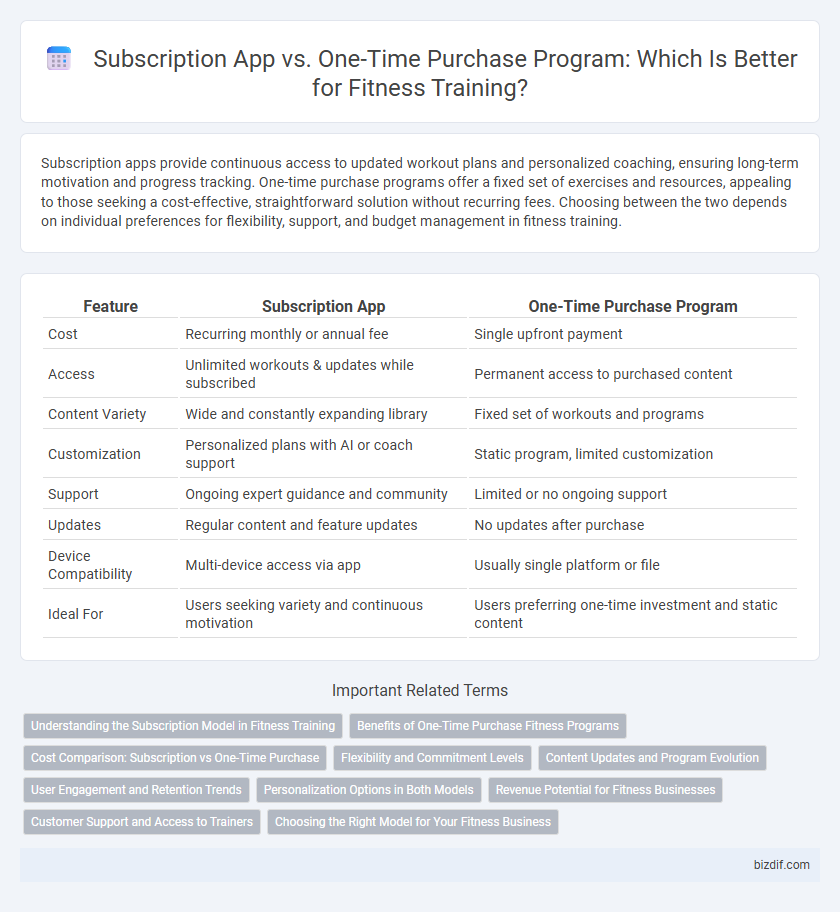Subscription apps provide continuous access to updated workout plans and personalized coaching, ensuring long-term motivation and progress tracking. One-time purchase programs offer a fixed set of exercises and resources, appealing to those seeking a cost-effective, straightforward solution without recurring fees. Choosing between the two depends on individual preferences for flexibility, support, and budget management in fitness training.
Table of Comparison
| Feature | Subscription App | One-Time Purchase Program |
|---|---|---|
| Cost | Recurring monthly or annual fee | Single upfront payment |
| Access | Unlimited workouts & updates while subscribed | Permanent access to purchased content |
| Content Variety | Wide and constantly expanding library | Fixed set of workouts and programs |
| Customization | Personalized plans with AI or coach support | Static program, limited customization |
| Support | Ongoing expert guidance and community | Limited or no ongoing support |
| Updates | Regular content and feature updates | No updates after purchase |
| Device Compatibility | Multi-device access via app | Usually single platform or file |
| Ideal For | Users seeking variety and continuous motivation | Users preferring one-time investment and static content |
Understanding the Subscription Model in Fitness Training
The subscription model in fitness training offers continuous access to a wide range of workouts, personalized plans, and regular updates, making it ideal for users seeking ongoing motivation and progression. Unlike one-time purchase programs, subscriptions provide flexibility with monthly or annual payments and often include community support and expert guidance to enhance consistency and results. This model supports scalable content delivery and frequent improvements, aligning with evolving fitness trends and user needs.
Benefits of One-Time Purchase Fitness Programs
One-time purchase fitness programs offer lifetime access to comprehensive workout plans and instructional videos, eliminating recurring fees and fostering long-term commitment. Users gain the flexibility to exercise at their own pace without subscription interruptions or cancellations. This cost-effective model provides immediate access to all content, ensuring continuous motivation and progress tracking without hidden charges.
Cost Comparison: Subscription vs One-Time Purchase
Subscription fitness apps typically charge monthly fees ranging from $10 to $30, allowing continuous access to updated workouts and features, which can accumulate to $120-$360 annually. One-time purchase programs often cost between $50 and $200, providing lifetime access but lacking ongoing content updates or personalized support. Evaluating long-term expenses and value depends on user preferences for ongoing guidance versus a single upfront investment.
Flexibility and Commitment Levels
Subscription apps offer enhanced flexibility with ongoing access to updated workouts and personalized plans, allowing users to adjust their fitness routines as their goals evolve. One-time purchase programs require a higher initial commitment but provide lifetime access without recurring fees, appealing to users who prefer a fixed, structured training regimen. Choosing between these options depends on individual preferences for ongoing support versus upfront investment and long-term flexibility.
Content Updates and Program Evolution
Subscription apps offer continuous content updates and evolving workout plans that adapt to the latest fitness trends and user progress, ensuring dynamic and personalized training experiences. One-time purchase programs provide fixed content with limited or no updates, resulting in static routines that may quickly become outdated. Regular updates in subscription models enhance motivation and long-term engagement by delivering fresh exercises and nutrition advice based on emerging research.
User Engagement and Retention Trends
Subscription fitness apps demonstrate higher user engagement and retention rates due to continuous content updates, personalized workout plans, and community features that foster motivation. One-time purchase programs often show a decline in usage over time as users lack ongoing incentives or evolving challenges. Data indicates subscription models boost long-term commitment and consistent workout adherence by up to 40% compared to single-purchase alternatives.
Personalization Options in Both Models
Subscription apps offer continuous updates and adaptive workout plans tailored to individual progress through AI-driven personalization features. One-time purchase programs typically provide fixed workout routines with limited customization, often requiring manual adjustments by users. The ongoing nature of subscriptions enables more dynamic, data-driven personalization compared to the static design of one-time purchase fitness programs.
Revenue Potential for Fitness Businesses
Subscription apps generate recurring revenue streams, increasing lifetime customer value and enabling predictable monthly income for fitness businesses. One-time purchase programs provide immediate revenue but lack ongoing engagement, limiting long-term earning potential and customer retention. Fitness companies leveraging subscription models benefit from higher scalability and sustained cash flow, essential for growth and investment in service enhancements.
Customer Support and Access to Trainers
Subscription apps offer continuous customer support and regular access to certified trainers, ensuring real-time guidance and motivation throughout the fitness journey. One-time purchase programs typically provide limited support and restricted communication with trainers, often lacking personalized feedback or ongoing assistance. Consistent interaction in subscription models enhances user engagement and helps maintain accountability for fitness goals.
Choosing the Right Model for Your Fitness Business
Evaluating a subscription app versus a one-time purchase program involves analyzing customer retention, recurring revenue, and engagement metrics to determine the optimal fitness business model. Subscription apps foster continuous user interaction and predictable income streams, enhancing long-term client loyalty and monthly revenue growth. One-time purchase programs appeal to clients seeking upfront value without ongoing commitments, making them suitable for targeted, short-term fitness goals.
Subscription App vs One-Time Purchase Program Infographic

 bizdif.com
bizdif.com